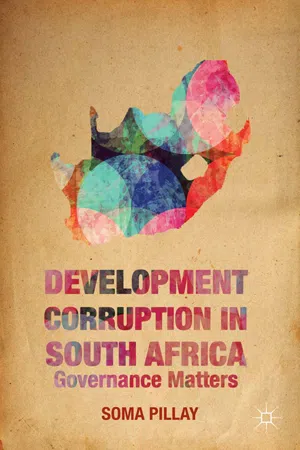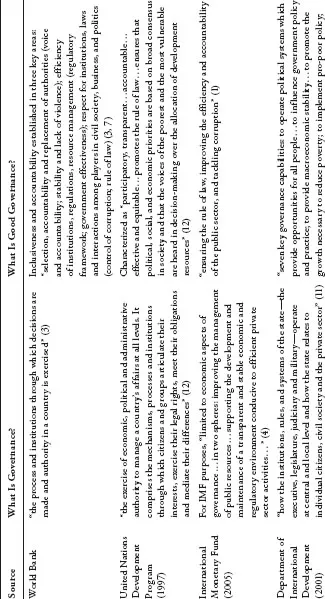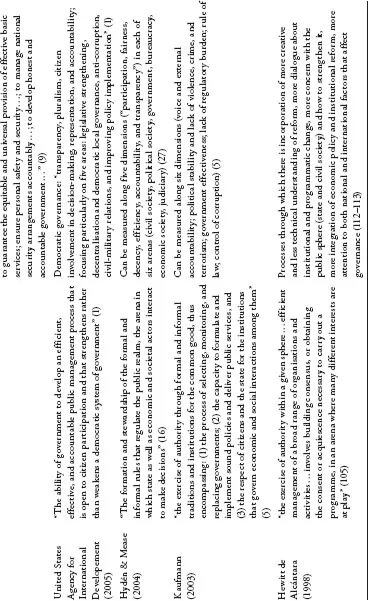
eBook - ePub
Development Corruption in South Africa
Governance Matters
Soma Pillay
This is a test
- English
- ePUB (apto para móviles)
- Disponible en iOS y Android
eBook - ePub
Development Corruption in South Africa
Governance Matters
Soma Pillay
Detalles del libro
Vista previa del libro
Índice
Citas
Información del libro
Development Corruption in South Africa examines governance matters with a focus on corruption. This rich empirical body on governance variables and governance performance is a welcome addition to South African government literature.
Preguntas frecuentes
¿Cómo cancelo mi suscripción?
¿Cómo descargo los libros?
Por el momento, todos nuestros libros ePub adaptables a dispositivos móviles se pueden descargar a través de la aplicación. La mayor parte de nuestros PDF también se puede descargar y ya estamos trabajando para que el resto también sea descargable. Obtén más información aquí.
¿En qué se diferencian los planes de precios?
Ambos planes te permiten acceder por completo a la biblioteca y a todas las funciones de Perlego. Las únicas diferencias son el precio y el período de suscripción: con el plan anual ahorrarás en torno a un 30 % en comparación con 12 meses de un plan mensual.
¿Qué es Perlego?
Somos un servicio de suscripción de libros de texto en línea que te permite acceder a toda una biblioteca en línea por menos de lo que cuesta un libro al mes. Con más de un millón de libros sobre más de 1000 categorías, ¡tenemos todo lo que necesitas! Obtén más información aquí.
¿Perlego ofrece la función de texto a voz?
Busca el símbolo de lectura en voz alta en tu próximo libro para ver si puedes escucharlo. La herramienta de lectura en voz alta lee el texto en voz alta por ti, resaltando el texto a medida que se lee. Puedes pausarla, acelerarla y ralentizarla. Obtén más información aquí.
¿Es Development Corruption in South Africa un PDF/ePUB en línea?
Sí, puedes acceder a Development Corruption in South Africa de Soma Pillay en formato PDF o ePUB, así como a otros libros populares de Economics y Economic Policy. Tenemos más de un millón de libros disponibles en nuestro catálogo para que explores.
Información
Categoría
EconomicsCategoría
Economic PolicyChapter 1

Governance Matters in South Africa
Introduction
Corruption is a near-universal phenomenon that takes many shapes and forms. As South Africa moves toward recognizing the devastating effects of corruption, the population there too realizes its enormous impact on the economic, social, and political scenario. On the economic front, corruption misdirects resources and discourages investment by the private sector.
Corruption also has significant social costs—it creates a culture of poverty and crime and deprives the neediest elements of society from availing themselves the benefits of government resources.
The political costs of corruption can be ruinous. Vibrant democratic institutions depend upon the consent and support of the governed. Public confidence is necessary for democratic institutions to remain healthy and flourish. Corruption destroys the confidence of people in their government and undermines the very legitimacy of political institutions. In its most pervasive and entrenched forms, corruption can be a source of political instability.
The great French novelist Victor Hugo once wrote that “greater than the tread of mighty armies is an idea whose time has come” (quoted in Pott, 1998:1). Over the years, there are increasing signs that ethics in the public services is an idea whose time has come. We now stand at a point where the environmental movement stood some 30 years ago—on the threshold of a heightened public awareness. In this case, the new awareness is that ethics in the South African Public Service is crucial to the success of the country’s democratic institutions. This awareness has taken root particularly in the past two decades in South Africa.
The Case of South Africa
In recent years, South African society has experienced a transition from having an unfamiliar past to a new democratic dispensation. As a result, public servants finding themselves in the midst of this transitional process were confronted by the principles and the philosophies of the past and the new value system of the present. These officials, subjected to internal and external influences, were and still are susceptible to unreasonable conduct.
Instances of corruption in the South African Public Service are reported on almost a daily basis. There is no scarcity of scandals that illustrate the depth and pervasiveness of corruption. In the wake of these scandals and the role that corruption has played, awareness has grown about the social, political, and economic costs of corruption that South Africa can ill afford. Corruption erodes public confidence in public institutions and leads to contempt for the rule of law. It exacts an inordinately high price from the poor by denying them access to vital basic services. With increasing intolerance of its devastating effects, pressure from citizens and financial markets has brought the nation to mount a national fight against corruption. The Constitution of the Republic of South Africa, 1996, highlights ethos and culture that promote transparency, accountability, and a participatory democracy. Back in 300 BC, Kautilya, a minister in the court of King Chandragupta in India, once stated, “Just as it is impossible not to taste the honey of the poison that finds itself at the tip of the tongue, so it is impossible for a Government Servant not to eat up at least a bit of the King’s revenue.”
Good Governance
The increased attention focused on corruption in South Africa warrants a need for establishing a process of good governance. It must be realized that a focus on corruption is only one side of the coin and that it must be coupled with a profile on good governance.
While there is consensus on the fact that corruption is rampant in the South African Public Service and is growing rapidly, there are several uncertainties about the nature of corruption in contemporary South Africa. The possibility of the transition process facilitating the growth of corruption indicates the urgent need to devise strategies based on empirical research that can limit corruption. The practical problems of maladministration and corruption are ethical issues, and the solution to these problems lies within the precepts of governance and ethics. In the process, a few of these uncertainties must be resolved. Media evidence, the information we receive from courts, official and unofficial reports suggest that corruption is not a matter of individual, exception modes of behavior, but something that is common practice in the public service affecting many sectors of activity. Despite the evidence available and various policy instruments that are in place in the South African Public Service to strengthen politician consciousness and good public administration, corruption is substantially less visible than many other types of crimes, and this is perhaps the reason why it has not been tackled with the appropriate vigor.
While there is some agreement on certain measures that can be taken, a substantial amount of clarification is needed to arrive at strategies that are likely to work. Another uncertainty concerns the process of transition toward a new state and society. While debates about how this transition process can affect the public service are taking place, little attention has been paid to the issue of corruption, its causes, the possible remedies, and its implications for good governance.
Over the years various legislative measures have been introduced to address corruption; however, a rich empirical body needs to be made available on governance variables and governance performance as it relates to corruption. The challenge ahead is to improve the gathering, analyzing, and disseminating of new data that should prove to be invaluable to the different stakeholders.
Conceptualizing good governance begins with its definition. The United Nations Development Programme (UNDP) has described governance as the exercise of political, economic, and administrative authority in the management of the affairs of a country at all levels. Good governance, in general terms, refers to a broad civil society with an array of governance practices that maximizes the common good. According to UNDP, some of the attributes of good governance include:
•participation, expecting all citizens to have a say in decision making, either directly or through the legitimate intermediate institutions representing their interests;
•rule of law, that is, the extent to which legal frameworks are fair and impartially enforced, especially laws on human rights;
•transparency, with free flow of information as its key; and
•accountability from the decision makers in the government and those in the private sector.
<<Table 1.1>> presents a sample of popular definitions of governance developed over the years, indicating how complex the concept appears. In moving from the definition of governance to good governance, these definitions become important because they are predicated on questions about how characteristics such as the rule of law, transparency, and accountability can be operationalized within a country.
Table 1.1 Establishing an Ethical Workplace


The process of governance requires accountable public officials. Public officials are those agents who are required to preserve high ethical standards under all circumstances. Over the recent years there is little evidence to show that emphasis has been placed on understanding the important dimensions of practicing administrative ethics in an institutional setting. The modern institution as a context for ethical behavior provides a new set of obligations, constraints, and pressures. The ethics of individual administrators alone will be irrelevant in many situations if they do not consider the ethical guidance provided in the context of their institutional role. The threatening state of moral degradation in society is reflected in the high levels of crime, disrespect for authority and the rule of law, and the erosion of key institutions. The role of the public servant then becomes important in the study of good governance.
This signaling is the basis of the justification for the study. The time has come for the cornerstone of the South African democracy, the public interest, to be revisited in debate and discussion on pursuance of the country’s constitutional obligations. Chapter 3 offers an examination of governance.
Until quite recently, the belief that corruption, by its “intrinsic nature,” was impossible to measure was accepted as truism, but a myriad of new surveys and other data-gathering techniques helped dispel this belief. This could have been because a rich empirical body of data might not have been available on governance variables and government performance, in general, and on corruption in particular. This book is based on the belief that the challenge ahead is to improve the gathering, analyzing, and disseminating of new data.
Increasingly, South African public media service can utilize and interpret these indices. Sound survey data and methodologies are needed to help make responsible choices about programs to control corruption. Corruption needs to be handled within a broad analytical framework, whether through public finance or other established disciplines or through an interdisciplinary approach. In the South African public service, serious anticorruption action programs are, in many ways, in their infancy and are rife with myths regarding strategies and policy implications. Misconceptions often result from the absence of in-depth analytical and empirical underpinnings for proposed anticorruption actions. The use of survey data can contribu...
Índice
- Cover
- Title
- 1 Governance Matters in South Africa
- 2 A Topography of Corruption
- 3 Legislative Measures and Institutional Structures
- 4 An Institutional Theory Perspective on Corruption: The Case of a Developing Democracy
- 5 Systemic Factors Moderating Whistle-Blowing
- 6 Exploring Whistle-Blowing Intentions in South Africa
- 7 Linking Cultural Dimensions with the Nature of Corruption
- 8 A Cultural Ecology of New Public Management
- 9 Conclusion
- Index
Estilos de citas para Development Corruption in South Africa
APA 6 Citation
Pillay, S. (2014). Development Corruption in South Africa ([edition unavailable]). Palgrave Macmillan US. Retrieved from https://www.perlego.com/book/3483524/development-corruption-in-south-africa-governance-matters-pdf (Original work published 2014)
Chicago Citation
Pillay, Soma. (2014) 2014. Development Corruption in South Africa. [Edition unavailable]. Palgrave Macmillan US. https://www.perlego.com/book/3483524/development-corruption-in-south-africa-governance-matters-pdf.
Harvard Citation
Pillay, S. (2014) Development Corruption in South Africa. [edition unavailable]. Palgrave Macmillan US. Available at: https://www.perlego.com/book/3483524/development-corruption-in-south-africa-governance-matters-pdf (Accessed: 15 October 2022).
MLA 7 Citation
Pillay, Soma. Development Corruption in South Africa. [edition unavailable]. Palgrave Macmillan US, 2014. Web. 15 Oct. 2022.